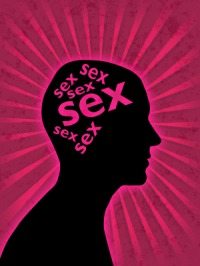The feelings we experience associated with sex and love are a cocktail of brain chemicals that influence our emotions and behaviors.
Dopamine = Pesistence
This neurotransmitter is responsible for the craving of sex. When we are in love and crave sex with our loved one, dopamine is elevated.
An increase in dopamine causes a surge of testosterone, the hormone connected to sexual desire. Dopamine is regulated by the reward system of the brain. When we experience low sexual desire it can usually be connected with lack of interest in sex, sexual boredom, low sexual self-esteem, and negative sexual experiences. If there is no motivation to have sex or associated with something negative, the reward center of the brain will not fire off dopamine.
Norepinephrine = Energy
The regulation of this neurotransmitter can affect energy levels and motivation for another person. When it is elevated one can feel an increase in energy, sleeplessness, and loss of appetite. Have you ever been too excited to sleep? Have you stayed up for hours thinking about a loved one, dreaming about a sexual experience, or fantasizing? This chemical will help you remember the details of a lover’s behavior, memories of your time together, and increase memory for new stimuli, such as novel ways of experiencing sex and love.
Serotonin = Mood
When we are in love our serotonin actually drops. Some of the behaviors we might experience are obsessive thinking and racing thoughts. The expression, “can’t get you out of my mind” is a result of low serotonin during passionate love.
Love and sex are a cocktail of HIGH dopamine and norepinephrine and LOW serotonin.
We have hard-wired programming responsible for our drive to love. What is the purpose of a sex drive? It helps us stay in connection with others. It provides pleasure and adventure. Sex regulates the mind and body. It tones every muscle in your body and relaxes the mind.
What is lust and how is it related to love?
Lust is our craving for sexual fulfillment. It can be strictly physical and driven by hormones and neurotransmitters activated in the brain. This feeling is characteristic of longing for sexual release.
Our drive for love is a motivation. It involves the brain system that is in control of planning and pursuit of specific wants and needs. This system is programmed to help us build and maintain intimate relationships. It also drives us to want to have sex with a partner.
Do we need to love?
Biologists would say that love is a drive similar to hunger, thirst, and warmth. It is focused on a specific reward. We can understand that hunger can be rewarded by eating food. What about sex? The reward can be subjective and influenced by every single love and sex experience that a person has.
Love is complicated and here’s why…
It is a combination of lust, romance, and attachment. It also changes form and evolves. Passion today will be something new tomorrow. Romantic love turns into companionate love. We can also create passion and romance which is what most of my work focuses on in sex therapy. We start our relationships in lust with a motivation towards sexual gratification. Relationships evolve towards attachment, a secure form of love. The emotions evoked by a secure attachment include safety, calm, and a desire for union with a secure partner.
Ester Perel, author of Mating in Captivity, stated, “How you were loved is how you love.” Our love behaviors are learned behaviors and a product of our environment. The chemical, biological, and psychological factors of sex can give us important clues to how we seek and maintain intimacy. The “cocktail of sex” is the interaction of brain chemicals influencing our motivation, drive, and perception of pleasure and passion.



